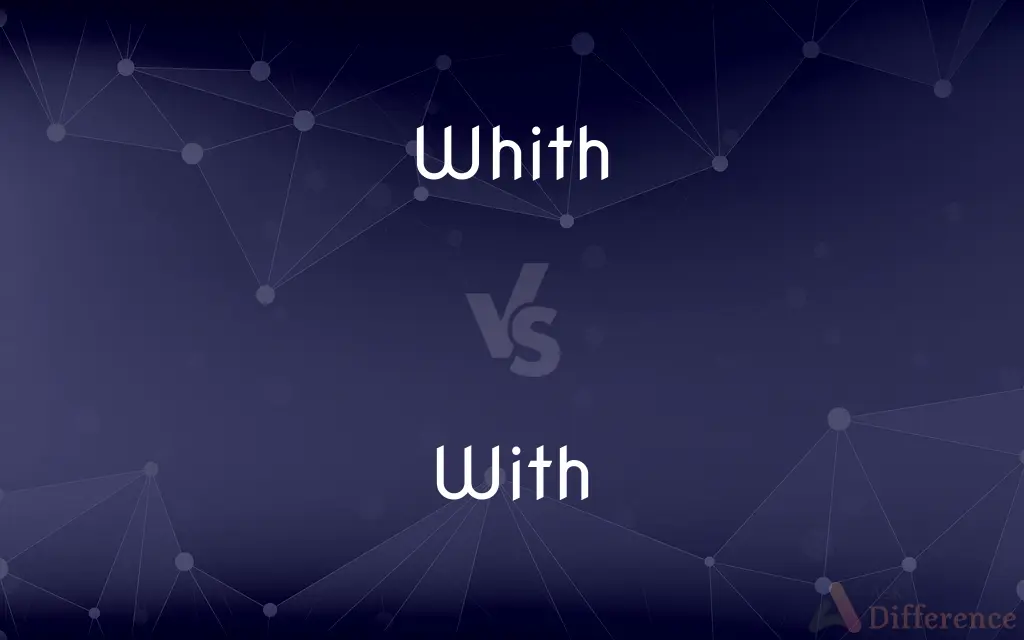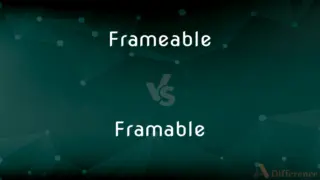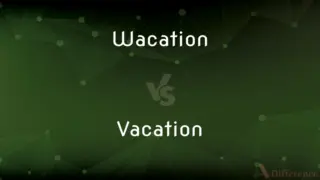Whith vs. With — Which is Correct Spelling?
Edited by Tayyaba Rehman — By Fiza Rafique — Updated on March 19, 2024
"Whith" is an incorrect spelling, while "With" is correct, indicating association, company, or accompaniment.

Table of Contents
Which is correct: Whith or With
How to spell With?

Whith
Incorrect Spelling

With
Correct Spelling
ADVERTISEMENT
Key Differences
Remember "With" as being concise, straightforward, and without an additional 'h'.
Think of "Without," where the correct form "With" is evident.
Recall common phrases you know like "with you" or "with them" to reinforce the spelling.
Think of "With" being associated with "Together," both having a single 'h'.
Note that there's no extra 'h' in the middle of "With."
ADVERTISEMENT
How Do You Spell With Correctly?
Incorrect: She came to the party whith her friend.
Correct: She came to the party with her friend.
Incorrect: I will go to the store whith you.
Correct: I will go to the store with you.
Incorrect: They shared the cake whith everyone at the table.
Correct: They shared the cake with everyone at the table.
Incorrect: He mixed the paint whith a stick.
Correct: He mixed the paint with a stick.
Incorrect: Can you bring that book whith you?
Correct: Can you bring that book with you?
With Definitions
Accompanied by or in the company of.
He came with his friends.
Possessing or having.
The girl with the blue hat is my sister.
Used to indicate means or instrumentality.
He opened the door with a key.
In regard to or concerning.
I'm annoyed with his behavior.
In opposition to or against.
He fought with his brother over the toy.
Accompanied by (another person or thing)
A nice steak with a bottle of red wine
Having or possessing (something)
A flower-sprigged blouse with a white collar
Indicating the instrument used to perform an action
Cut the fish with a knife
Treatment with acid before analysis
In opposition to
A row broke out with another man
Indicating the manner or attitude in which a person does something
The people shouted with pleasure
Indicating responsibility
Leave it with me
In relation to
My father will be angry with me
Employed by
She's with the Inland Revenue now
In the same direction as
Marine mammals generally swim with the current
Indicating separation or removal from something
To part with one's dearest possessions
Their jobs could be dispensed with
In the company of; accompanying
Did you go with her?.
Next to; alongside of
Stood with the rabbi.
Sat with the family.
Having as a possession, attribute, or characteristic
Arrived with bad news.
A man with a moustache.
Used as a function word to indicate accompanying detail or condition
Just sat there with his mouth open.
A patient with a bad back.
In a manner characterized by
Performed with skill.
Spoke with enthusiasm.
In the performance, use, or operation of
Had trouble with the car.
In the charge or keeping of
Left the cat with the neighbors.
In the opinion or estimation of
If it's all right with you.
In support of; on the side of
I'm with anyone who wants to help the homeless.
Of the same opinion or belief as
He is with us on that issue.
In the same group or mixture as; among
Planted onions with the carrots.
In the membership or employment of
Plays with a jazz band.
Is with a publishing company.
By the means or agency of
Eat with a fork.
Made us laugh with his jokes.
By the presence or use of
A pillow stuffed with feathers.
Balloons filled with helium.
In spite of
With all her experience, she could not get a job.
At the same time as
Gets up with the birds.
In regard to
We are pleased with her decision. They are disgusted with the status quo.
Used as a function word to indicate a party to an action, communicative activity, or informal agreement or settlement
Played with the dog.
Had a talk with the class.
Lives with an aunt.
In comparison or contrast to
A car identical with the one her sister just bought.
Having received
With her permission, he left. I escaped with just a few bruises.
And; plus
My books, with my brother's, make a sizable library. We had turkey with all the trimmings.
Inclusive of; including
Comes to $29.95 with postage and handling.
In opposition to; against
Wrestling with an opponent.
As a result or consequence of
Trembling with fear.
Sick with the flu.
So as to be touching or joined to
Coupled the first car with the second.
Linked arms with their partners.
So as to be free of or separated from
Parted with her husband.
In the course of
We grow older with the hours.
In proportion to
Wines that improve with age.
In relationship to
At ease with my peers.
Being the partner of in a romantic relationship
In April, I will have been with my husband 24 years.
As well as; in favorable comparison to
She could sing with the best of them.
According to the experience or practice of
With me, it is a question of priorities.
Used as a function word to indicate close association
With the advent of the rockets, the Space Age began.
As company; along
We're going to the movies. Are you coming with?.
Against.
He picked a fight with the class bully.
In the company of; alongside, close to; near to.
He went with his friends.
In addition to; as an accessory to.
She owns a motorcycle with a sidecar.
Used to add supplemental information, especially to indicate simultaneous happening, or immediate succession or consequence.
Jim was listening to Bach with his eyes closed.
The match result was 10-5, with John scoring three goals.
With a heavy sigh, she looked around the empty room.
Four people were injured, with one of them in critical condition.
With their reputation on the line, they decided to fire their PR team.
In support of. redundant to be with#English?
We are with you all the way.
In regard to.
There are a number of problems with your plan.
What on Earth is wrong with my keyboard?
He was pleased with the outcome.
I'm upset with my father.
(obsolete) To denote the accomplishment of cause, means, instrument, etc; – sometimes equivalent to by.
Slain with robbers
Using as an instrument; by means of.
Cut with a knife
I water my plants with this watering can. This is the watering can I water my plants with.
Find what you want instantly with our search engine.
They dismissed the meeting with a wave of their hand.
Speak with a confident voice.
(obsolete) Using as nourishment; more recently replaced by on.
Having, owning.
It was small and bumpy, with a tinge of orange.
Affected by (a certain emotion or condition).
Speak with confidence.
He spoke with sadness in his voice.
The sailors were infected with malaria.
Prompted by (a certain emotion).
Overcome with happiness
Green with envy; flushed with success
In the employment of.
She's was with Acme for twenty years before retiring last fall.
Keeping up with; understanding; following along.
That was a lot to explain, are you still with me?
(US) Along, together with others, in a group, etc.
Do you want to come with?
Alternative form of withe
See Withe.
With denotes or expresses some situation or relation of nearness, proximity, association, connection, or the like.
To denote a close or direct relation of opposition or hostility; - equivalent to against.
Thy servant will . . . fight with this Philistine.
To denote association in respect of situation or environment; hence, among; in the company of.
I will buy with you, talk with you, walk with you, and so following; but I will not eat with you, drink with you, nor pray with you.
Pity your own, or pity our estate,Nor twist our fortunes with your sinking fate.
See where on earth the flowery glories lie;With her they flourished, and with her they die.
There is no living with thee nor without thee.
Such arguments had invincible force with those pagan philosophers.
To denote a connection of friendship, support, alliance, assistance, countenance, etc.; hence, on the side of.
Fear not, for I am with thee, and will bless thee.
To denote the accomplishment of cause, means, instrument, etc; - sometimes equivalent to by.
That with these fowls I be all to-rent.
Thou wilt be like a lover presently,And tire the hearer with a book of words.
[He] entertained a coffeehouse with the following narrative.
With receiving your friends within and amusing them without, you lead a good, pleasant, bustling life of it.
To denote association in thought, as for comparison or contrast.
Can blazing carbuncles with her compare.
To denote simultaneous happening, or immediate succession or consequence.
With that she told me . . . that she would hide no truth from me.
With her they flourished, and with her they die.
With this he pointed to his face.
To denote having as a possession or an appendage; as, the firmament with its stars; a bride with a large fortune.
With Meaning in a Sentence
He left the keys with the front desk.
They traveled with only a backpack each.
With hard work, you can achieve your goals.
Can you share that information with me?
She wore a dress with polka dots.
With each step, they moved closer to the summit.
He was very patient with the children.
She always drinks her coffee with sugar.
The room was decorated with balloons and streamers.
She paired the shirt with her favorite jeans.
With all due respect, I disagree.
The area is teeming with wildlife.
With perseverance, they overcame the challenges.
I agree with you on that point.
The gift was wrapped with a red ribbon.
She looked at him with admiration.
He speaks with confidence and clarity.
The letter came with a beautiful postcard.
She was filled with joy at the news.
The contract was signed with a flourish.
With the wind at our backs, we sailed faster.
The movie ended with a surprising twist.
They were faced with a difficult decision.
The book comes with a recommendation from the author.
He greeted us with a warm smile.
With Idioms & Phrases
With all due respect
A polite way of expressing disagreement.
With all due respect, I think your decision is a mistake.
With flying colors
To pass or complete something very successfully.
She passed her exams with flying colors.
With open arms
To welcome warmly.
The community welcomed the new residents with open arms.
At odds with
In conflict or disagreement.
His views are at odds with the mainstream.
In line with
In agreement or conformity.
Our policies are in line with current regulations.
To be fraught with
To be filled with something undesirable.
The plan is fraught with risks.
With bells on
To arrive eagerly or with enthusiasm.
I'll be at your party with bells on!
With a grain of salt
To view something with skepticism or not take it literally.
Take his advice with a grain of salt.
With an iron hand
To govern or control in a strict or harsh manner.
He ruled the company with an iron hand.
Deal with the devil
To form a pact or engage cooperatively with someone who is considered untrustworthy or evil.
They said he made a deal with the devil to achieve his success.
To do something with one's eyes closed
To do something very easily.
He can solve those puzzles with his eyes closed.
With the benefit of hindsight
Understanding of a past event using knowledge gained later.
With the benefit of hindsight, we would have made a different decision.
With bated breath
To wait for something with great anticipation.
Fans awaited the announcement with bated breath.
Hand in hand with
In close association or cooperation.
Success goes hand in hand with hard work.
With one's hands tied
Unable to act freely due to restrictions.
I'd help you, but I'm with my hands tied by the rules.
To be in bed with
To be closely connected with, often in a questionable manner.
The politician was accused of being in bed with corrupt businesses.
To come with the territory
To be a natural or expected part of something.
Long hours just come with the territory in medical residency.
Sleep with one eye open
To remain alert or cautious, especially in dangerous situations.
In that neighborhood, it's wise to sleep with one eye open.
Dance with death
To do something extremely dangerous.
Skydiving feels like dancing with death to some people.
With one's tail between one's legs
To retreat in a humiliated or defeated manner.
He came back with his tail between his legs after losing the argument.
Common Curiosities
What is the pronunciation of With?
"With" is pronounced as /wɪð/ or /wɪθ/.
What is the verb form of With?
"With" is a preposition and doesn't have a verb form.
Which conjunction is used with With?
"With" can be followed by standard conjunctions, such as "and" or "but."
Which preposition is used with With?
As "with" is itself a preposition, it doesn't typically require another preposition.
Is With a noun or adjective?
"With" is primarily a preposition.
Which vowel is used before With?
The vowel "i" is used in "with."
What is the plural form of With?
"With" doesn't have a plural form.
Is With an abstract noun?
No, "with" is not an abstract noun.
Why is it called With?
The word "with" comes from Old English "wiþ," meaning "against" or "toward."
What is the root word of With?
The root word is Old English "wiþ."
What is the singular form of With?
"With" is a preposition and doesn't have a singular or plural form.
Which article is used with With?
"With" doesn't require a specific article before it.
Is the word “With” a Direct object or an Indirect object?
"With" is a preposition and is neither a direct nor an indirect object.
How many syllables are in With?
There is one syllable in "with."
What part of speech is With?
"With" is a preposition.
Which determiner is used with With?
"With" can be used with any determiner depending on the context, such as "the," "a," "this," "that."
Is With a vowel or consonant?
"With" is a word containing both vowels and consonants.
Is With a collective noun?
No, "with" is not a collective noun.
Is the With term a metaphor?
No, "with" itself isn't a metaphor but can be used in metaphorical contexts.
What is a stressed syllable in With?
The entire word "with" is stressed.
What is another term for With?
Another term could be "alongside."
Is the word With a gerund?
No, "with" is not a gerund.
Is With an adverb?
No, "with" is not an adverb.
What is the opposite of With?
The opposite of "with" could be "without."
What is the second form of With?
"With" doesn't have verb forms.
Is With a negative or positive word?
"With" is neutral.
Is With a countable noun?
No, "with" is not a noun.
Is the word With imperative?
No, "with" is not imperative.
How do we divide With into syllables?
"With" is one syllable and isn't divided further.
What is the first form of With?
"With" is a preposition and doesn't have verb forms.
Share Your Discovery

Previous Comparison
Frameable vs. Framable
Next Comparison
Trochar vs. TrocarAuthor Spotlight
Written by
Fiza RafiqueFiza Rafique is a skilled content writer at AskDifference.com, where she meticulously refines and enhances written pieces. Drawing from her vast editorial expertise, Fiza ensures clarity, accuracy, and precision in every article. Passionate about language, she continually seeks to elevate the quality of content for readers worldwide.
Edited by
Tayyaba RehmanTayyaba Rehman is a distinguished writer, currently serving as a primary contributor to askdifference.com. As a researcher in semantics and etymology, Tayyaba's passion for the complexity of languages and their distinctions has found a perfect home on the platform. Tayyaba delves into the intricacies of language, distinguishing between commonly confused words and phrases, thereby providing clarity for readers worldwide.













































